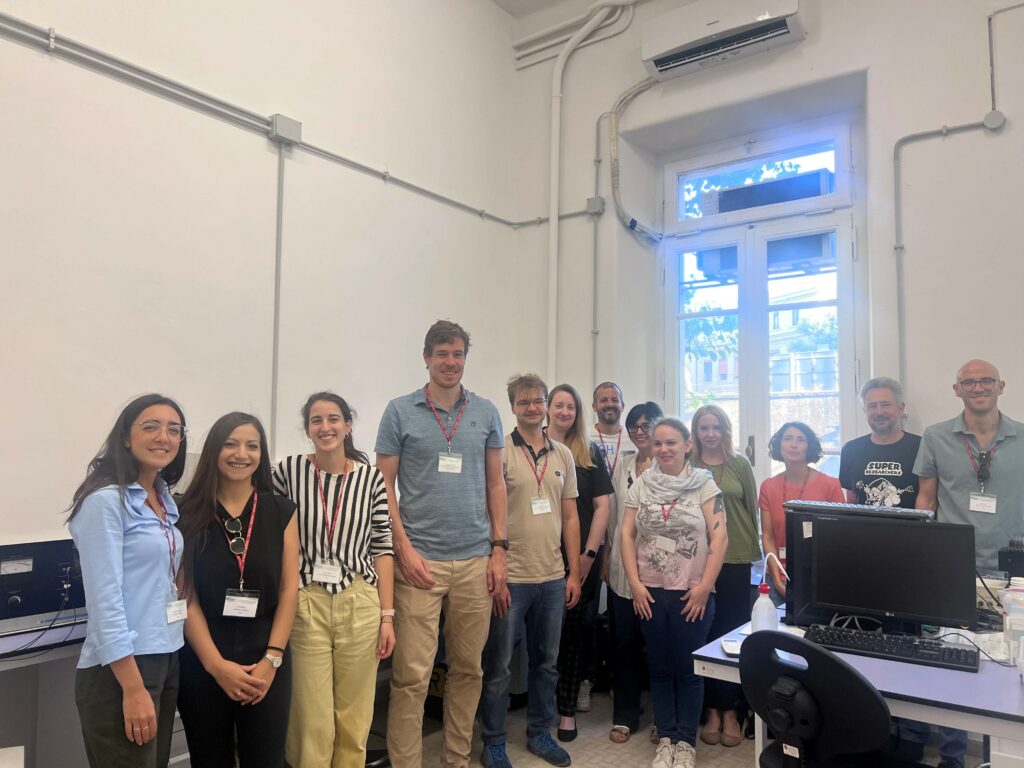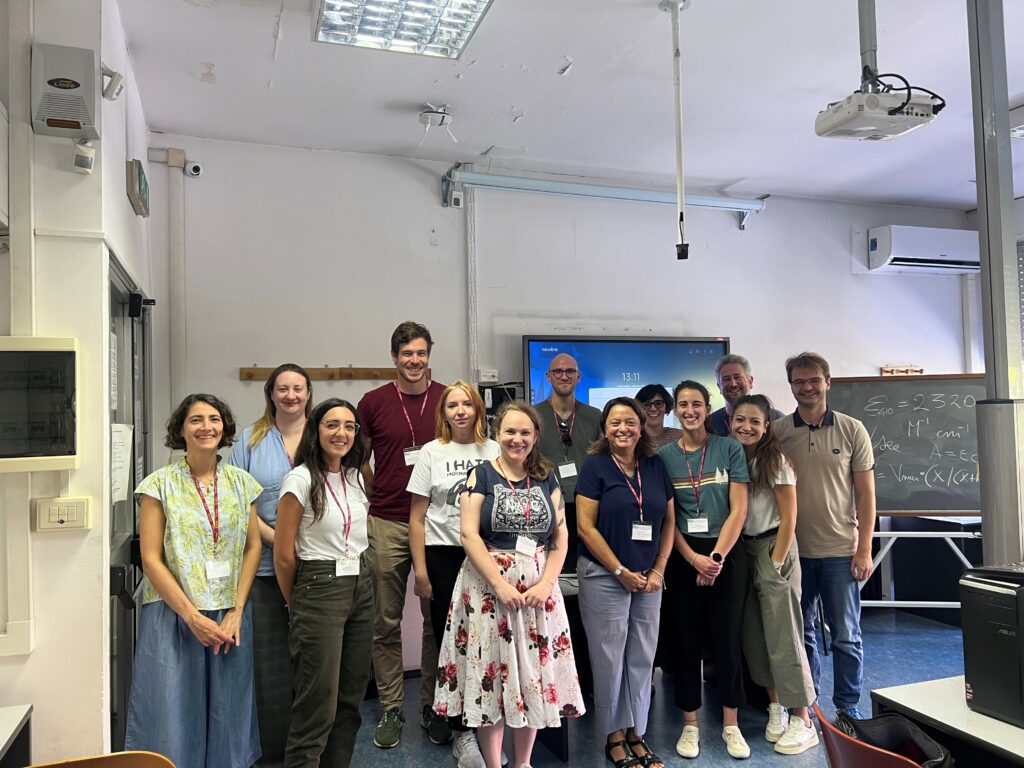ESC4: Advanced kinetics approaches to unravel protein structure and function
Dates: 2nd-4th October 2023
Location: Sapienza University of Rome, Italy (DSB-UROM)
Full address: Dipartimento di Scienze Biochimiche “A. Rossi-Fanelli”, Sapienza University of Rome, P.le Aldo Moro 5, 00185 Rome
Number of participants: 9
It is no longer possible to apply for this course.

Description of the course:
The course will be focused on the application of advanced kinetics techniques (stopped flow binding and folding experiments, FRET, T-Jump) to study protein structure and functions and to dissect several kinetics mechanisms.
Understanding the links between protein structure and function is a critical task of Molecular Biology. Such a goal has critical scientific implications, spanning from basic research to practical applications such as drug discovery and the development of new therapies. In this perspective, advanced kinetic approaches have emerged as powerful tools for unravelling these features: the ESC4 course “Advanced Kinetics Approaches to Unravel Protein Structure and Function” covers a range of kinetic and spectroscopic techniques that may help scientist to unveil the subtle links between protein structure and function. These techniques include stopped-flow, T-jump and Forster resonance energy transfer (FRET) experiments.
In a stopped-flow apparatus, two solutions are rapidly mixed and subsequently stopped, allowing for the recording of spectroscopic signal changes over time. Optical signals typically include variations of absorbance, fluorescence, and/or circular dichroism. The dead-time of a stopped flow is in the order of ms, such that this technique is suitable for monitoring both fast and slow reaction kinetics. On the other hand, the T-jump methodology is based on a fast discharge on a quart cuvette, which results in a fast increase in the solution temperature. By applying this method it is possible to monitor the relaxation to a new equilibrium and therefore to address the reaction kinetics. The dead time of this method is in the order of microseconds, allowing to address ultrafast reactions.
Thanks to these techniques, it is possible to dissect the kinetic mechanism involving protein-protein interactions, protein (un)folding, enzyme activity, ligand binding, and FRET. With the knowledge and skills gained from this course, scientists will be better trained to tackle the challenges in biochemical and biophysical research.
Outline of the course:
The course will start on Monday the 2nd and end midday Wednesday the 4th of October.
Day 1
13:00: Registration and welcome to the participants.
14:00 Introduction: MOSBRI, possibilities and perspectives
Lecture 1: Essential kinetics in biochemistry and biophysics
Lecture 2: Experimental methods to address time resolved reaction kinetics
Lecture 3: Experimental characterization of folding and binding reactions
Coffee break
Lecture 4: Steady-state analysis of complex inhibition systems
Lecture 5: Pre steady-state analysis to dissect the mechanism of enzyme catalysis
Day 2
Practical sessions
Participant speed talks (5’ each): each participant will be required to briefly present his/her research.
Three groups will be formed for hands-on teams consisting of 3 participants. The duration of each practical session will be approximately 2 hours, so that Day 2 will be entirely devoted to the experimental part. A rotation between groups and practical courses will be organized.
Due to organizational reasons, participants are not allowed to bring their own samples.
Practical topics: Stopped flow binding and folding experiments, FRET, T-Jump
Evening of Day 2: Dinner with the participants and the tutors
Day 3
Day 3 will consist of kinetic data analysis and discussion.
~Midday: Feedback and goodbye.
Other details:
Participants will receive financial support to attend the course, including a contribution to their travel, lunch, dinners, and 2 nights of accommodation (accommodation will be booked by the organizers). Successful applicants will be informed of the eligible expenses when they receive a formal acceptance letter.
Download a pdf version of a flyer for this course via the link below:
The MOSBRI end user short course “Advanced kinetics approaches to unravel protein structure and function” was held in Rome in October 2023
The course was hosted by Francesca Cutruzzolà, Serena Rinaldo, Roberto Contestabile, Francesco Malatesta, Stefano Gianni, Angelo Toto (teaching and organising staff), Chiara Di Lucente (organising staff) and spanned three days. The course focused on applying advanced kinetic techniques such as stopped-flow binding and folding experiments, T-Jump, and Forster resonance energy transfer (FRET) to study protein structure and function. These methods are crucial for understanding the relationship between protein structure and function, with significant implications for scientific research, drug discovery, and therapy development. On the first day of the course, participants were provided with a comprehensive theoretical overview of the subject through lectures delivered by the teaching staff. The second day was exclusively dedicated to hands-on experimental techniques, allowing participants to gain practical experience using the advanced kinetic methods discussed. On the third day, the focus shifted towards data analysis, equipping attendees with the skills to interpret and draw meaningful conclusions from the results. During these days, participants also took a brief tour of the DSB-UROM facilities, gaining insights into the opportunities this partner provides.
Course programme
Monday 2nd October 2023
| 13:00 | Welcome and Registration |
| 13:45 | Introduction: MOSBRI, possibilities and perspectives Prof. Francesca Cutruzzolà |
| 14:00 | Lecture 1: Essential kinetics in biochemistry and biophysics Prof. Francesco Malatesta |
| 14:45 | Lecture 2: Experimental methods to address time resolved reaction kinetics Prof. Stefano Gianni |
| 15:30 | Lecture 3: Experimental characterization of folding and binding reactions Prof. Angelo Toto |
| 16:15 | Coffee break |
| 16:40 | Lecture 4: Steady-state analysis of complex inhibition systems Prof. Roberto Contestabile |
| 17:25 | Lecture 5: Rapid kinetics to dissect the mechanism of enzyme catalysis Prof. Serena Rinaldo |
| 18:45 | Library – building CU027, 2nd floor – Wine reception |
Tuesday 3rd October 2023
Practical sessions. Three groups will be formed for hands-on teams consisting of 3 participants, three group rotations are planned (named round 1, 2, 3). Due to organizational reasons, participants are not allowed to bring their own samples.
| 09:00 | Round 1 |
| 11:30 | Round 2 (1st part) |
| 13:00 | Lunch |
| 14:30 | Round 2 (2nd part) |
| 15:30 | Round 3 |
| 19:30 | Dinner with the participants and the tutors Ristorante La Scaletta |
Wednesday 4th October 2023
| 09:00 | Participant speed talks (5’ each) Each participant will be required to briefly present their research. |
| 10:00 | Data analysis and discussion on enzyme kinetics experiments Participants will bring their own laptop with the 30-days demo of Prism software for data fitting |
| 11:00 | Data analysis and discussion on equilibrium folding experiments |
| 12:00 | Data analysis and discussion on kinetics folding experiments |
| 13:00 | Feedback and goodbye. |
Course material
Lecture 1– Essential kinetics in biochemistry and biophysics
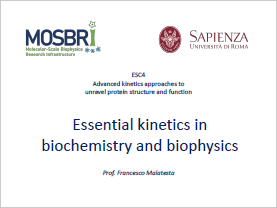
Lecture 2 – Experimental methods to address time resolved reaction kinetics
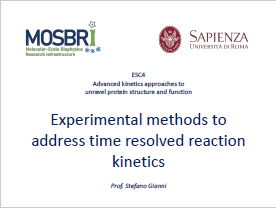
Lecture 3 – Experimental characterization of folding and binding reactions
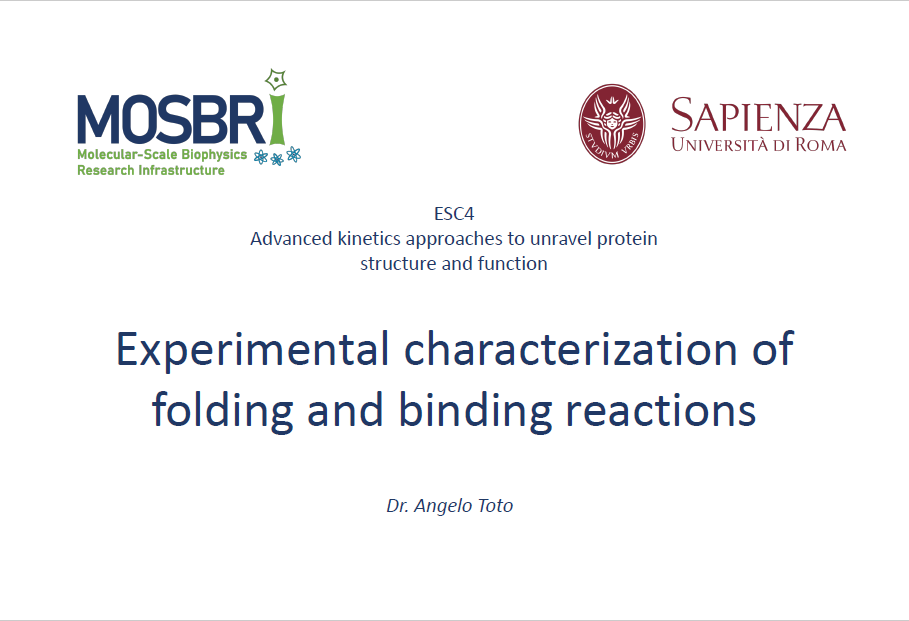
Lecture 4– Steady-state analysis of complex inhibition systems
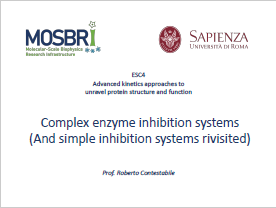
Lecture 5 – Rapid kinetics to dissect the mechanism of enzyme catalysis
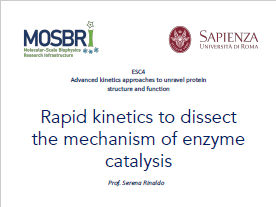
Application to take part in the course
The course is limited to 9 participants and therefore any interested parties will need to submit an application for consideration to take part.
Who is eligible to apply:
Anyone with a workplace/host institution in one of the EU member or associated states may apply to attend this course (this includes people from the UK). Applicants from industry are also welcome. It is expected that the applicant has at least a basic knowledge of molecular biology, chemistry and/or biophysics and that it is applicable to their area of research/work. Applications from scientists in the early-stage of their career are particularly encouraged and we will strive to obtain a gender balance of the participants in the course.
How to apply:
The application consists of:
- submission of a completed course application form which includes:
- motivation for attendance
- a short scientific CV
- if you are a student or postdoc, a reference letter.
Once the application period is closed, all submissions will be reviewed and the applicants will be informed of the outcome.
When to apply:
It is no longer possible to apply for this course. The applications received are under review and applicants will be informed once a decision has been made.
Application deadline:
The deadline for submission of an application to participate in this course was the: 30th June 2023 24th June 2023.
